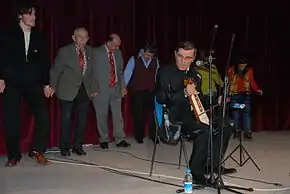Horon (dance)
Horon (Pontic: χορόν, romanized: khorón)[1] is a group of traditional folk dances from the Pontus or Eastern Black Sea Region in Turkey.[2]

Horon with kemenche

Children from Turkey perform folk dance
Name
Etymology
The term horon derives from Greek choros (Greek: χορός, romanized: khorós), which means "dance." The earliest instance of its usage in a Turkic language is in Codex Cumanicus from 1303.[1]
Origin
Horon dances originated from the ancient koron-horon, a form of pagan worship. Over 50 variations of horon have been identified in a single region.[3]
Dance
The horon is typically performed by a group of men or women in a line or semicircle. This dance form involves fast shoulder shimmy (tremoulo), trembling of the entire body, and sudden squats.[4] Horon dances require speed and agility in a dancer.[3]
See also
References
- Nişanyan, Sevan. "horon". NişanyanSözlük. Retrieved 7 November 2022.
- Gazimihal, Mahmut R. (1991). Türk halk oyunları kataloğu (in Turkish). Kültür Bakanlığı. p. 152. ISBN 978-975-17-0920-2. Retrieved 7 November 2022.
- "Horon Folk Dance | All About Turkey". www.allaboutturkey.com. Retrieved 2023-09-22.
- "Top 9 Turkish Culture, Customs and Etiquette". toplist.info. Retrieved 2023-09-22.
This article is issued from Wikipedia. The text is licensed under Creative Commons - Attribution - Sharealike. Additional terms may apply for the media files.